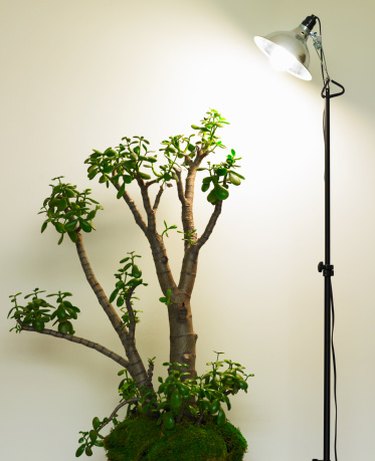
Jade plants (Crassula argentea) require relatively minimal care and gardeners consider them easy-to-grow as houseplants. These plants are succulents, so they only require water about once per week. Jade plants occasionally have problems with mildew growing on them, especially powdery mildew. Gardeners can often remedy the problem, especially if caught early.
Clean Up
Video of the Day
Reduce humidity and fungal spores in the area by gathering and removing fallen diseased leaves. Powdery mildew spores spread easily through water and even in the air, so gardeners should destroy fallen infected leaves to keep the spores from spreading.
Video of the Day
Reduced Humidity
Mildew thrives in humid environments, so gardeners should reduce humidity to help remedy mildew. To reduce humidity, avoid overwatering. Cornell University plant experts recommend watering jade after its soil dries out thoroughly -- about once per week. Too much moisture in the soil can cause roots to start rotting and the humidity created by overly damp soil also contributes to powdery mildew on jade plant leaves.
Proper Watering
The horticulture department at Iowa State University Extension recommends watering plants early in the morning to allow time for their leaves to dry off during warmer daytime temperatures. Gardeners should also try to pour water directly onto the soil at the base of the plant rather than over the plant's foliage. This method helps keep jade plant leaves dry and less hospitable to powdery mildew.
Temperature
Keep plants away from cold air drafts, as Iowa State University Extension suggests. Powdery mildew grows best in cool conditions, so keeping the plant away from drafts can help get rid of the disease.
Fungicides
Gardeners should consider fungicides to treat powdery mildew outbreaks. Natural fungicides with potassium bicarbonate, Bacillus subtilis or neem oil can kill powdery mildew on indoor plants without very harsh or toxic chemicals. Pennsylvania State University also recommends thiophanate methyl or triadimefon, although these products contain harsher ingredients than the first three.
Removal
As difficult as it can be to throw away a treasured houseplant, gardeners should sometimes throw away severely infected plants. Plants with severe fungal infections may not get better with remedies and gardeners should throw away these plants to prevent the fungal spores from spreading to other, healthy houseplants.